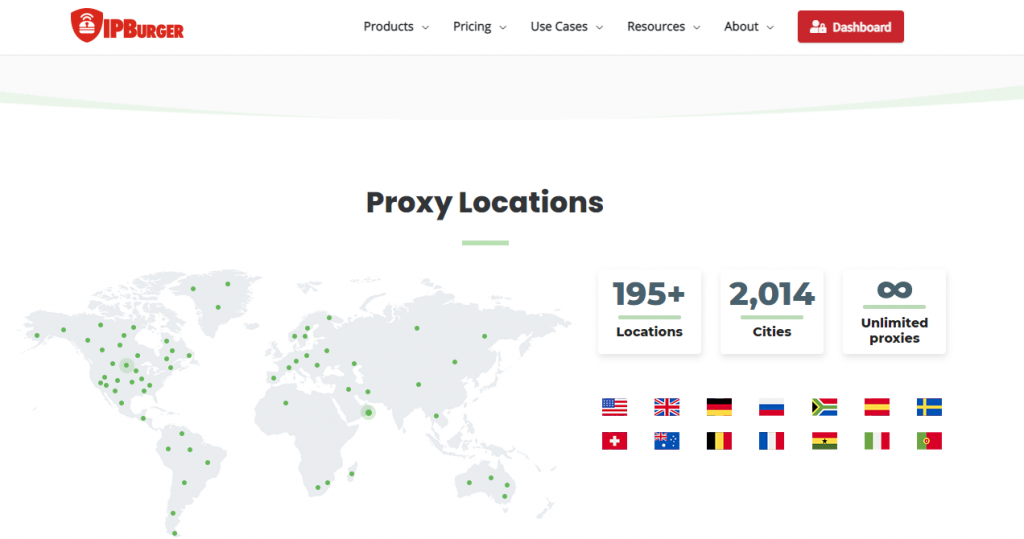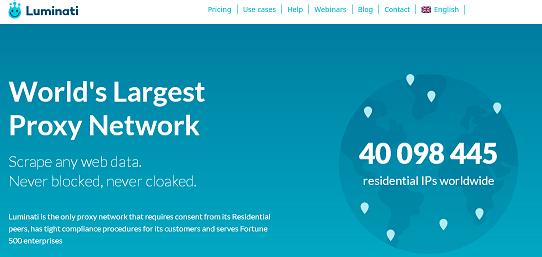Residential Proxy IP Pool
In the world of proxy services, biggest isn’t always best but it’s certainly better than being the smallest. For most of us who use proxies the worst-case scenario is sharing the IP addresses with someone doing exactly the same thing as us. For example, if you’re running your Instagram marketing software, having someone running the exact same software is going to cause you both problems. You’re both pushing the limits, running Jarvee on aggressive settings and crossing your fingers hoping for the best. Yet Instagram will just see the same IP addresses and you’ll be flagged very quickly. Sharing a proxy and IP addresses with a fellow marketer is worse than not using a proxy at all!
Many proxy services will try and prevent this situation developing by dedicating their proxies (or more accurately the IP addresses) for specific tasks. So, you’ll get Twitter services, or Instagram proxies or those who market on Facebook and so on. By grouping users together like this they can ensure there’s no overlap – the IP address is rotated between users evenly. However, no-one will use the same address concurrently. On a good, professional service this can work very well however it does take a lot of work to isolate these addresses and ensure they’re not blocked by the target site. Obviously, the risk is that the addresses are overused on the specific platform, by sharing the addresses like this but at least they won’t be used concurrently.
Residential Proxies are Anonymous
The root of the problem is largely to do with the scarcity of residential IP addresses that you need for many tasks nowadays. If you’ve tried some proxy providers, it sometimes feels like they’ve only got a few dozen genuine residential IP addresses. The rest are patched up and filled in with datacentre IP addresses which will work ok for some tasks but are completely hopeless for many. The more IP addresses available of course the less likely you’re going to get issues with clashes and blacklisting. So, who has the most addresses? Which proxy provider will give you an almost unlimited number of residential IP addresses at your disposal?

Which Proxy Company has the Largest Residential Proxy Pool of IP Addresses?
Residential addresses are so hard to obtain in bulk format there’s actually very few contenders for this title. Normally it’s difficult to obtain residential IPs in any number especially if you’re trying to build a network from scratch. Initially some of the earliest adopters in this market tried all sorts of tactics to obtain and control these addresses directly.
Renting them directly from users or setting up hardware in residential homes definitely worked but was hugely expensive and difficult to maintain. Besides creating a pool of residential IP addresses like this was extremely hard work. Basically, any company who adopted any model along these lines was definitely aiming for quality over quantity. It was also very difficult to make this method pay commercially as you had to charge so much for each IP address to cover the costs. The other problem was providing specific requirements so if someone wanted to buy a UK proxy then it was even more difficult to fill these requests.
Not surprisingly the companies who now pretty much dominate the residential proxy market took a different route from this to create their networks and proxy pools , relying on a much more hand’s off approach and one which is arguably a lot more controversial.
Here’s a quick rundown of several of the major players in the residential proxy world.
Storm Proxies
I like this company for many reasons and have used them for years. Unlike many proxy companies they provide excellent support and will honor refund and money back requests. They don’t have a huge residential IP network like many of the companies, advertised at some 70,000 nodes. However all these are not necessarily residential IP addresses. They’re huge advantage though is that they own and control both the addresses directly and the hardware on which the proxies run.
IPBurger
IPBurger is one of the biggest providers of proxies and VPNs in the world. They were setup in 2007 and are currently based in the USA servicing both users and businesses. They are however one of the biggest suppliers of residential proxies and have over 60 million residential proxies available in 195 countries. You can access these proxies through any standard configuration however IPBurger have developed a series of custom applications which have won awards within the industry.
IPBurger have a strong following and many people use them for all their residential proxy needs. One of their biggest markets however is for people operating multiple eBay accounts. Some businesses operate several large scale accounts for different markets and their proxies are particularly useful for this purpose.
Although their most popular ranges are the extensive network of residential proxies, they’re also worth checking out for other purposes. Remember not every task needs residential IP addresses, sometimes you’re better off using high quality datacenter proxies instead. Often using dedicated proxies with standard commercial IP proxy pools works better than sharing a residential IP address with lots of others.
Indeed, using residential proxies can be pointless for many tasks as they’re just not needed. Using residential IPs for web scraping tasks for instance is a pointless expense of course they will work perfectly if you can afford them. Additionally, you can obscure your location and maintain privacy using data centre IP addresses too.
One of IP Burger’s great strengths is their custom applications and VPN clients that you can use to connect to their proxies. I’ve been using their Chrome extension for watching BBC iPlayer from outside the UK, combined with an exclusive proxy it works better than any VPN service on the market too. SO, if you’re just after something for streaming the BBC via a proxy there’s nothing more reliable at the moment. You should choose the dedicated/exclusive proxy with a UK IP address which will be free of all IP bans and concurrent connection request problems.
Bright Data (Formerly Luminati Network)
Probably the largest residential proxy network belongs to a company called Bright Data. They used to be known as Luminati but changed their name recently to avoid the negative connotations. They claim to have over 40 million residential IP addresses available on their proxy network. Luminati’s business model is similar to Microleaves where it has co-opted standard home users into their network by offering some sort of application. In this instance it was a ‘free to use’ VPN solution called Hola which is used all over the world. When the user installs the application they are agreeing to allow part of their internet connection to be used as an exit node int their residential network.
Some years ago, Luminati was heavily criticised as their method was deemed deceptive. Many users were completely unaware that their machines and bandwidth were used when they installed the Hola application. The agreement did specify this situation but were hidden in the terms and conditions and were not easy to find. Hence the vast majority of Hola users were not aware that they were agreeing to be part of this ‘commercial botnet’. In response to this Luminati has attempted to clarify this situation and now makes these conditions much clearer before the user installs the application.
Again whatever you think about the ethics of this proxy building method it does create a hugely impressive residential based network of ultimate proxies. Every connection is from a standard home user running a copy of Hola (or one of their other applications), routing through these gives almost complete anonymity and a genuine residential IP address. They make great sneaker proxies and indeed anything that needs access to cheap residential proxies. Furthermore Luminati has created an impressive back office infrastructure which allows proxy customers to control where and how their connections are routed e.g by country, city etc. The huge drawback that used to stop people using Luminati was there minimum monthly spend which was quite substantial ! However they seem to have ditched that approach and now even relatively small requirements for monthly residential proxies can be supported.


